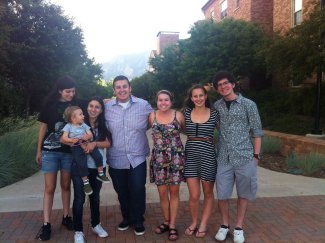Interns Summer in Review, Part 2: Sharing Across Cultures
September 24, 2014
By Stephanie Cortes
I am Stephanie Cortes, a summer intern in NEON’s terrestrial instrument group (also known as the Fundamental Instrumentation Unit, or FIU). FIU is a science department whose purpose is to facilitate instrument-based collection of abiotic terrestrial, atmospheric, and soil data in a standardized way across all of the NEON terrestrial sites. I worked on building an algorithm that automatically quantifies phenology in different ecosystems from a series of digital pictures. I come from Bogotá, Colombia where I study Environmental Engineering and Industrial Engineering at the Universidad de los Andes. You might ask, “What’s a student from Colombia doing here?” I am actually a dual citizen interested in learning about both cultures and contributing to solving environmental problems. I decided to come to NEON for the summer because I wanted to work on a challenging project and learn how ecology works in the real world, and to be part of an organization that not only cares about climate change, but supports real science on this global problem.
Colombia is a country extremely rich in natural resources. Colombia rates the highest in biodiversity per square meter for the whole planet. It is also the wettest spot on Earth (12,000 mm of precipitation per year in Lloró, Chocó) and more than 50% of Colombian territory is covered by jungle. Sadly, Colombia’s fast economic development has made some people forget the value of nature, and particular industries, like mining, have damaged local ecosystems. Before coming to NEON, I thought I would never find a place where people see the value of nature and ecology. I thought it was almost impossible to have a culture that would work towards a healthier planet.
Today I think differently; what I thought was a utopia is daily life at NEON. Within my first month at NEON I realized I was sharing my days with people who are dedicated to contributing to a better planet. The first thing I noticed was how ecology is part of daily life at work. In the morning, it is common to see people coming to work on bicycles, walking, running, and driving hybrids. Everyone also contributes to decreasing the amount of non-degradable trash in the environment. For example, our break rooms are equipped with reusable plates, cups, silverware and automatic dishwashers. My mind was amazed by the fact that, if you had to use plastic silverware or cups, even these were compostable! During lunch conversations, I learned about people’s decisions while grocery shopping and that many prefer organic products with environmentally friendly packages. All of these things have shown me that people at NEON not only collect data on ecological processes, but they go beyond their work and try to live in ways that lessen their impact on the environment.
Another thing I have learned at NEON is teamwork. Before arriving, I thought scientific working relationships were competitive and not team-oriented. In my NEON team, things are completely the opposite. Each person contributes with their knowledge to the goal of building the observatory. Everyone comes from a different background and nobody knows everything; and it is never wrong to ask questions. If you don’t understand something, the other members of the team are happy to teach you. Also, colleagues spend time with their teammates outside work hiking, having dinner together, and enjoying other fun activities that build friendships. We even went bowling together. With this, I feel that working in a diverse team not only helps one person to grow and learn, it makes the whole team better because relationships are stronger and diversity complements everyone.
Stephanie Cortes Brown Bag presentation at headquarters
Because of this strong sense of teamwork and my own unique perspective, I wanted to share a bit of my home country with my new colleagues and gave a presentation at NEON about Colombian diversity. I talked about Colombian biodiversity and cultural diversity. I shared fun facts and Colombian treats. My purpose was to share my perspective, coming from a country highly vulnerable to climate change, about the importance of contributing to NEON. Lots of people attended and asked questions afterwards. Several told me that they now want to visit my country!
Finally, NEON staff taught me an important lesson about taking advantage of every minute of the day to enjoy our world. I come from a very big city where my life has turned into a monotony of driving in slow traffic to go to school and then back. A big city covered in cement and buildings makes you forget that outside there is a planet with interesting forms of life and nature waiting to be discovered. The people at NEON invited me to enjoy life as they do. My colleagues, scientists and engineers passionately working to determine optimal ways to collect quality-assured environmental data, spend much of their free time outdoors, enjoying the trails near the Flatirons hiking, running, or rock climbing, just to enjoy the beauty of nature. , These people push to discover new things and contribute to science. Some even write books, like my mentor Mike SanClements, who wrote a book on trying to live without plastic. Seeing these exciting lives has taught me that life is too short to live the same way every day; life is better when you are curious and passionate about fully exploring your surroundings.
After this summer I know I am going back home not only with new knowledge on how to analyze images for quantifying phenology, but with a different way of living life like my friends at NEON. I came to NEON primarily for the science, but what I also gained was a new perspective on the nature of the people who do this kind of work. And I’m glad to be one of them.

Headquarter interns
This is the second in a series of September blog posts written by our 2014 summer interns reflecting on their experiences at NEON.
